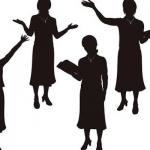For the past several decades, it has been taboo for white people to make disparaging generalizations about people of other races. We call it racism when somebody does that. Because of this taboo, we have developed an elaborate system of innuendo and coded language to get around it. But the Trump age has shattered white taboo. The most recent example of this was the widespread defense of Trump’s categorization of African countries as shitholes. It was in this context that American Conservative senior editor Rod Dreher wrote a blog post called “Of Shitholes and Second Thoughts” in which he expressed regret for having judged Donald Trump too harshly for calling African countries shitholes.
Dreher starts off his piece by contrasting two opposing responses to Trump’s comment that both “resonate” with him. The first critiques Trump for using “monstrous, dehumanizing language,” while the second says that “some countries are shitholes” and commends Trump for “break[ing] the spell of silence the Left is forever weaving around us.”
Dreher muses why he resonates with both pieces and then he dumps out a paragraph that has made him infamous this week on social media:
Let’s think about Section 8 housing. If word got out that the government was planning to build a housing project for the poor in your neighborhood, how would you feel about it? Be honest with yourself. Nobody would consider this good news. You wouldn’t consider it good news because you don’t want the destructive culture of the poor imported into your neighborhood. Drive over to the poor part of town, and see what a shithole it is. Do you want the people who turned their neighborhood a shithole to bring the shithole to your street?
As people have lashed out against Dreher for saying this aloud, one of his most common rejoinders has been to say that white liberals think this way too; they just keep it to themselves. It’s certainly true that there’s a categorical difference between the ideology and psychology of white liberalism (which is mostly about intellectual sophistication) and an actual commitment to living in solidarity with marginalized people. I don’t have any more respect for white liberals than Dreher does.
My first gut reaction to Dreher’s statement was complete shock. I’ve never seen a Christian speak that contemptuously about poor people without cloaking their views in more “wit and grace” to use words from Dreher’s article. It’s kind of like when a kid drops the F bomb in elementary school and everyone gasps to see what the teacher is going to do. Dreher gets a lot of moral energy out of the sense that he’s “bravely” violating a taboo and saying what everyone else is “really” thinking. One of the core deceits of the “political correctness” debate is the idea that whatever speech is forbidden must be true as a result. That’s why the most dishonest president in the history of our nation is still considered a man who “tells it like it is” among those who call themselves the defenders of “absolute truth.”
What if we set aside the question of whether Dreher’s statement is “outrageous” because he violated social taboo?What if we evaluate his writing not in terms of its conformity to social taboo but as a measure of his intellectual rigor and spiritual maturity? Intellectually, this paragraph would be embarrassing even if it weren’t hideously cruel to poor people. Dreher lacks any sense of curiosity about why poor shithole communities become shitholes.
What role do landlords play in turning neighborhoods into shitholes? What about predatory businesses like loan sharks? What about the lack of access to fresh groceries? Today I learned that one of the main reasons eastern Durham, NC (my hometown) became a shithole is because the city owned hundreds of acres of abandoned property that became blighted, overgrown,and literally filled with rats and snakes. Shitholes become shitholes for many overlapping reasons. To blame their existence entirely on the people who live there is lazy and anti-intellectual.
Regarding Dreher’s spiritual maturity, we have to notice the incredible irony that a man who has built his brand off of a rhetorical use of monasticism would speak this contemptuously of poverty, which is a cornerstone of monastic life. In this sense, Dreher is revealing more plainly what his Benedict Option really amounts to: a (rich) gated community free of shithole-dwellers (and the undesirable gay people whose exclusion is the entire content of his Christian “orthodoxy”).
Withdrawing from the world to the shithole-free suburbs is what rich white people have been doing since the Civil Rights movement. And every step of the way, they’ve tried to justify their contemptuous class elitism by framing it in religious terms as a quest for moral purity (since those welfare mamas and their thug baby daddies are so promiscuous). What started as overt segregationism has sublimated itself as “family values” heteropatriarchy as the theological justification and scapegoating have evolved over the past several decades.
But the Benedict whose name Dreher co-opted for his book actually chose poverty over wealth. So his quest for holiness was coming from a completely different place than Dreher. Benedict himself was born noble and sent off to Rome to study, but he was disgusted by the decadence he found there, so he abandoned his career path to become a hermit and only much later an abbot in a monastery. If Benedict were alive in our culture, he would look like a dumpster-diving, college dropout crusty punk kid squatting in a shithole urban wasteland instead of an Italian cave. His pursuit of a life other than the mainstream capitalist career ladder would be summarily dismissed by people like Rod Dreher as “the destructive culture of the poor.”
So when we set aside the taboo that Dreher “heroically” stands up to, he doesn’t come off very well. Still I’m ambivalent about retiring the taboo against being overtly racist and elitist. Dreher’s article also draws from another piece that creates a visceral racialized image of the shithole of Africa. A conservative woman named Karin McQuillan who spent a year as a Peace Corps volunteer turns her anecdotal experiences into a sociological indictment of the subhuman culture of an entire continent:
In plain English: shit is everywhere. People defecate on the open ground, and the feces is blown with the dust – onto you, your clothes, your food, the water…
Never in my wildest dreams would I have imagined that a few decades later, liberals would be pushing the lie that Western civilization is no better than a third-world country. Or would teach two generations of our kids that loving your own culture and wanting to preserve it are racism.
Last time I was in Paris, I saw a beautiful African woman in a grand boubou have her child defecate on the sidewalk next to Notre Dame Cathedral. The French police officer, ten steps from her, turned his head not to see…
The more I worked there and visited government officials doing absolutely nothing, the more I realized that no one in Senegal had the idea that a job means work. A job is something given to you by a relative. It provides the place where you steal everything to give back to your family.
Dreher cleverly avoids owning the racist generalizations McQuillan is advancing about Africa as a continent by presenting her article (whose excerpts comprise more than a third of his blog post) as just one view that’s “out there.” He invites his readers to share if they’ve gone to Africa and experienced things other than people shitting on the sidewalk and sitting around in government offices doing nothing.
When I read McQuillan’s words, it helps me understand better why people want to punch Nazis rather than letting them speak in an academic setting. These words do actual violence to the humanity of Africans by creating a visceral image of people who shit on sidewalks and don’t understand the concept of work. One of the major deficiencies of the Western culture which McQuillan and Dreher both consider to be superior to African culture is the naive presumption that there’s a huge chasm between the world of rhetoric and the physical world — that words cannot cause physical violence. White nationalists who go to Charlottesville-like protests have turned the words of McQuillan and others like her into their rationalization for beating up black people. I wrote my term paper about 16th century Spanish colonialists who used similarly visceral language about native American people to justify genocide.
We are facing a legitimate crisis in understanding the appropriate role of social taboo and the appropriate limits of free speech. I’m not saying that McQuillan should be thrown in jail for circulating nakedly racist stereotypes about Africans. I am open-endedly wondering if her hideously dehumanizing words do make a case for the need for the social taboos that white people have been vigorously throwing off this year.
The social taboos of “political correctness” are a paradox. On the one hand, they are the yeast with which white supremacists bake their ideology. Without political correctness, Milo Yiannapoulos would have zero content. On the other hand, words that dehumanize need to be challenged vigorously even if they are words that describe events that actually happened (which are then generalized into stereotypes and moral judgments). When I went to Nicaragua, the air throughout Managua consistently smelled like burnt rubber. It was a very visceral experience that nauseated me the whole time, but I almost never talk about it because the stories that I tell about Nicaragua are about the village I visited where ex-Sandinistas and ex-Contras have managed to rebuild their relationships after trying to kill each other in a CIA-funded civil war three decades ago. Just because something is anecdotally factual does not mean that it cannot be manipulated into dehumanizing speech.
So is it reasonable to ban McQuillan from talking about Africans shitting on the sidewalk in certain spaces? What if she were invited to give a speech to elementary school students and she started talking about it? Would it be somebody’s duty to stop her even if she didn’t use any four letter words? Would it be reasonable for a university to have a policy that people who make speeches that use anecdotes to dehumanize a continent of people should not receive tuition dollars to make those speeches? Do academic institutions have any responsibility to protect their students from dehumanizing speech? How does one adjudicate what counts as dehumanizing speech? What’s the difference between critiquing whiteness as a racial ideology and saying that a certain race of people don’t know how to work or shit in the toilet?
I’m not saying what the right answer to each of these questions is. I am saying they are valid questions to consider. “Political correctness” did not cause Karin McQuillan to decide that Africans are people who shit on sidewalks and sit around their government offices doing nothing. If I were a college student, I would not want my tuition dollars to be spent on a plane ticket or an honorarium for Karin McQuillan to speak (which is what happens when college student organizations host speakers whether they’re liberal or conservative). So neither freedom of speech nor the related question of social taboo are as simple as media pundits make them out to be.
In any case, in a world without white taboo, it cannot be taboo for me to call Karin McQuillan a white supremacist and to call Rod Dreher a class elitist posing as a moral purist. That is part of my truth-telling duty as a Christian who is called to defend people who are being dehumanized rather than protect the feelings of the rich white people who are doing the dehumanizing.













